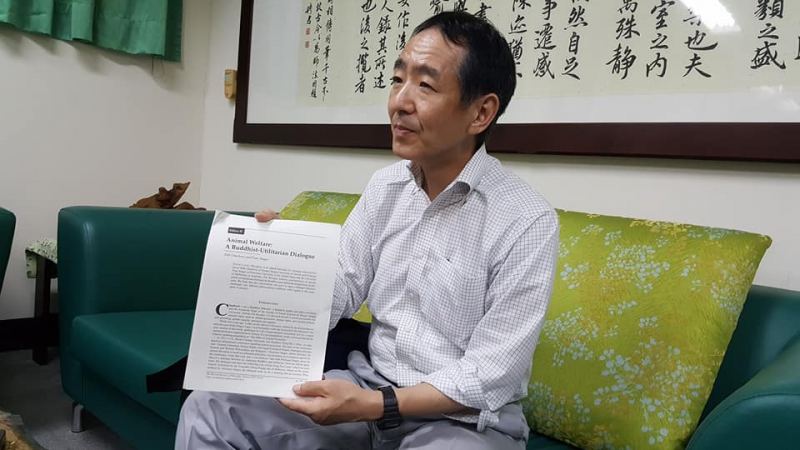
編按:本文是山口教授2019年9月間訪臺之際,受關懷生命協會邀請而特別為《臺灣動物之聲》撰寫的文章,山口教授以英文撰寫的原始版本同時也發佈於下方,英文篇名"Great Interest in the Life Conservation Association" 表達了山口教授對於關懷生命協會抱持興趣想要了解之意。感謝山口教授的賜稿與曾琬淋小姐的翻譯貢獻。

我研究經濟活動的倫理學,對畜牧業中的動物倫理尤感興趣。
日本資本主義之父澀澤榮一(渋沢栄一,1840-1931)提出了商業與儒家道德的結合。澀澤的肖像預定會出現在2024年的10,000日元鈔票中,而他關於儒家商業哲學的書現在也成為了暢銷書。儒家思想實際上對日本的職業道德產生了很大影響。不過,日本的傳統道德不僅基於儒家,亦以佛教為基礎。在統治階級的成員接受儒學教育的同時,人們在江戸時代(1603-1868)信奉大乘佛教。江戶時代的第五位幕府將軍德川綱吉(1646-1709)接受一位和尚的建議,頒佈了《生類憐憫令》(生類憐みの令)。這些法令禁止所有階級的人殺死或傷害幾乎所有種類的動物,包括禁止遺棄因年老或疾病而變得無用的馬或牛,買賣生物,甚至將諸如蚱蜢之類的昆蟲關在籠子飼養。綱吉希望通過這些法令,能夠將佛教的慈悲美德灌輸給人民,並使社會更加和平。儘管他的統治時期(1680-1709年)被認為是江戶文化的黃金時代,但他的繼任者在他去世後廢除了這些法令。自此,日本大地上的農場動物的狀況便每況愈下。 1870年代,在1868年的明治維新後,一場反佛教運動興起,全國各地摧毀了許多佛教寺廟、佛像、書籍和其他禮儀物品。失去了擔任政府職務資格的佛教僧侶,開始放棄素食和獨身生活。佛教徒對農場動物福利的影響減弱了,農場動物的地位變得更加令人擔憂。
在日本,大多數農場動物都是在沒有任何法律保護的情況下,在工廠農場裡被殘酷剝削。積極致力於保護貓和狗等家庭寵物的日本動物福利組織,對諸如雞、豬和牛等農場動物的福利並不十分感興趣。有一些動物權利組織積極致力於改善農場動物的福利,但仍然是缺乏影響力。而動物權利運動從未在日本取得過政治影響力。我認為動物權運動人士在日本未受到關注的原因之一,是因為他們主要是受彼得 • 辛格和湯姆 • 雷根等西方哲學家的影響,而二人的動物權利哲學在這個社會聽起來格格不入。日本的動物權利運動沒有紮根於日本傳統的道德觀念,即儒家和佛教。如果佛教僧侶在動物福利和權利運動中發揮領導作用,那麼農場動物的福利將能大大提高。
日本從中國進口了大乘佛教,但是佛教在日本發生了幾項重大變化。現在的日本佛教與原始的大乘佛教有很大不同。我相信道地的佛教在臺灣仍然得以保留著,佛教徒也積極倡導素食主義和改善動物福利。我開始著手研究日本和臺灣動物福利運動的比較歷史。當然,我對關懷生命協會的歷史特別感興趣。我相信日本可以從臺灣佛教倫理學中獲得很多啟示。
相關連結:
山口教授的介紹
http://professor.kanagawa-u.ac.jp/econ/economics/prof09.html
昭慧法師於臉書記錄與山口教授的「倫理對話」
https://www.facebook.com/chaohwei/posts/10156878991578409
Great Interest in the Life Conservation Association
Takumi Yamaguchi(山口拓美)
I study ethics in economic activities with a particular interest in animal ethics in the livestock industry.
Eiichi Shibusawa(渋沢栄一) (1840-1931), who is known as the father of Japanese capitalism, proposed the union of business and Confucian morality. A portrait of Shibusawa(渋沢) is scheduled to be included on the 10,000 yen note in 2024, and his book on Confucian business philosophy is a strong seller now. Confucianism actually has had a great influence on the Japanese work ethic. However, traditional Japanese morality was based on not only Confucianism but also Buddhism. While the members of the governing class were educated in Confucianism, the people believed in Mahayana Buddhism in the Edo period(江戸時代) (1603-1868). Tsunayoshi Tokugawa(徳川綱吉) (1646-1709), the fifth shogun of the Edo period, taking a Buddhist monk’s advice, issued the Edicts on Compassion for Living Things(生類憐みの令). These edicts forbade people of all classes to kill or harm almost all animals, to abandon horses or cattle that became useless due to old age or sickness, to buy and sell living beings, and even to keep insects, such as grasshoppers, in cages. With these edicts Tsunayoshi(綱吉) intended to instill the Buddhist virtue of compassion into the people, and to make society more peaceful. Although his reign (1680-1709) is considered to be the golden age of Edo culture, his successor repealed the edicts after his death. Since then, the status of farm animals on Japanese soil has been declining. In the 1870s, an anti-Buddhist movement grew up following the Meiji Restoration of 1868, and a lot of Buddhist temples, statues of Buddha, books and other ritual materials were destroyed across the country. Buddhist priests, who had lost the privilege of being government agents, began to abandon vegetarianism and celibacy. Buddhists’ influence on farm animal welfare diminished, and the status of farm animals got much worse.
In Japan, most farm animals are exploited ruthlessly in factory farms without any legislative protection. Japanese animal welfare organizations, which actively work on protecting domestic animals such as cats and dogs, are not very interested in the welfare of farm animals such as chickens, pigs, and cows. There are a few animal rights groups that are active in improving farm animal welfare, but they are not influential. Animal rights movements have never held political influence in Japan. I think one of the reasons why animal rights activists have not gained traction in Japan is because they are under the influence of Western philosophers such as Peter Singer and Tom Regan, and their animal rights philosophy sounds very outlandish in this society. Japanese animal rights movements have not taken root in traditional Japanese morality, namely Confucianism and Buddhism. If Buddhist priests took leadership in animal welfare and rights movements, the welfare of farm animals would improve significantly.
Japan imported Mahayana Buddhism from China, but Buddhism underwent several major changes in Japan, and the present Japanese Buddhism is quite different from the original Mahayana Buddhism. I believe that in Taiwan authentic Buddhism still remains, and that Buddhists are active in promoting vegetarianism and improving the welfare of animals. I am beginning to work on a comparative study of the history of animal welfare movements in Japan and Taiwan. As a matter of course, I especially have a great interest in the history of the Life Conservation Association. I am certain that Japan can gain a great deal of enlightenment from Taiwanese Buddhist ethics.